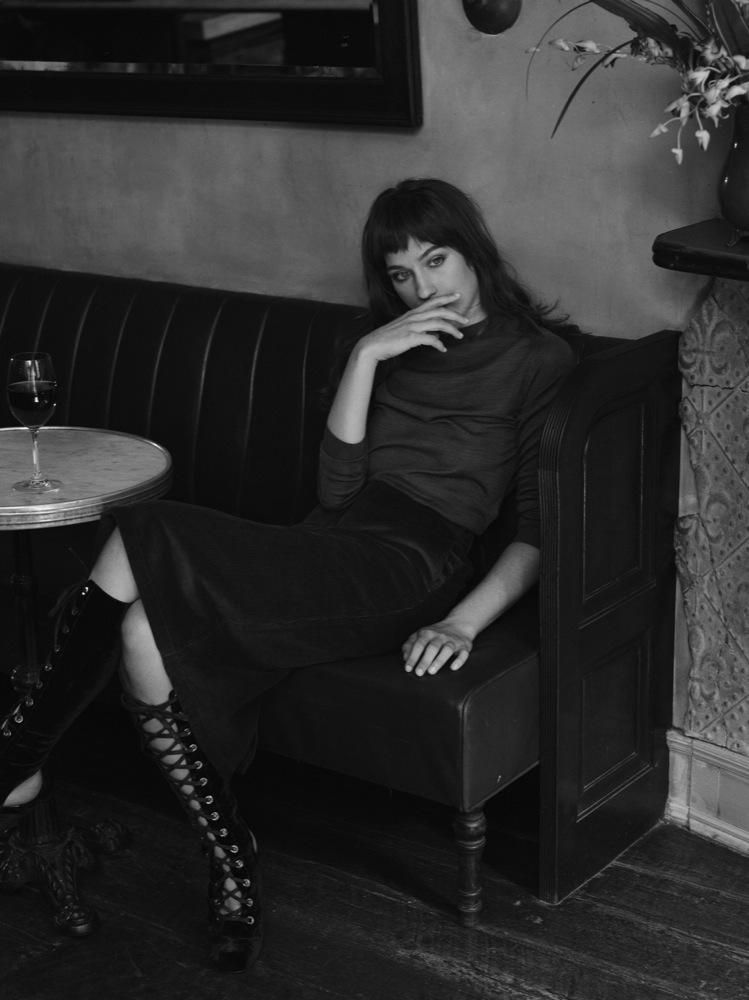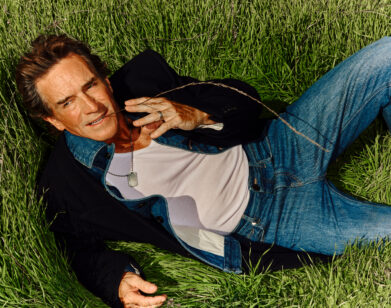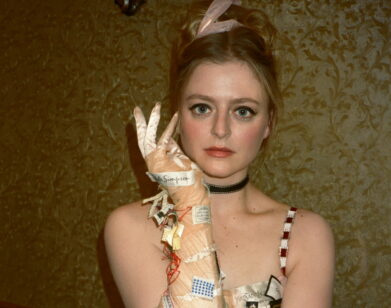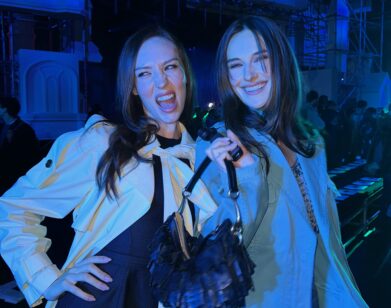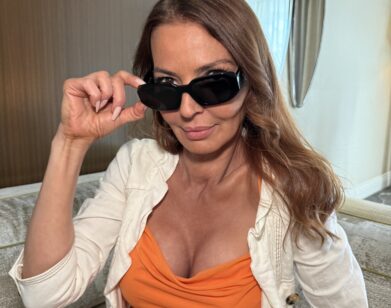Lola Kirke
LOLA KIRKE AT MAISON PREMIERE IN BROOKLYN, NEW YORK, SEPTEMBER 2016. PHOTOS: MATTHEW SPROUT/EXPOSURE. STYLING: CLAUDIA CIFU. HAIR: HOLLY MILLS/TIM HOWARD MANAGEMENT USING AVEDA, INCLUDING SMOOTH INFUSION STYLE PREP SMOOTHER, LIGHT ELEMENTS TEXUTURIZING BALM, AND AIR CONTROL HAIRSRAY. MAKEUP: CYNDLE KOMAROVSKI/HONEY ARTISTS USING CHANEL. PHOTO ASSISTANTS: JONATHAN FASULO AND JORDAN STRONG.
“I definitely feel like I’m more creative when I’m a little bit down,” explains Lola Kirke over the phone. “I’m so uncomfortable when I’m a little bit down, I just have to do something about it. I’m happy that doing something translates into something constructive rather than destructive.”
Born in London and raised in Brooklyn, Kirke is a well-regarded actor-on-the-rise. Over the last three-odd years, she has worked with powerhouse directors such as David Fincher (Gone Girl) and starred in indie movies like 2014’s coming-of-age screwball comedy Mistress America. As aspiring oboist Hailey Rutledge, she is the poster-woman for Mozart in the Jungle, Amazon’s most successful original series to-date. Earlier this year, she wrapped American Made, Doug Liman’s new thriller starring Tom Cruise. Though she is the youngest child in a family of creatives, she seems to have quickly escaped the shadow of her siblings’ and parents’ achievements. For her next project, she will act opposite her real-life sister Jemima Kirke in Emma Forrest’s directorial debut Untogether.
But Kirke isn’t one to let success make her complacent. Tomorrow, the 26-year-old will release her debut EP as a singer, songwriter, and guitarist via Spirit House. “It’s been this amazing re-entry into being a struggling artist,” she says with a laugh. Simply titled EP, the four-track record is a dreamy blend of folk, country, and rock. “Gene Clark is one of my all-time favorite musicians. He’s a founding member of the Byrds and he coined this new genre called ‘cosmic American,'” she explains. “It was that moment in the ’70s where great rock ‘n’ roll musicians started making country music and got rejected by the country fans and the rock ‘n’ roll fans,” she continues. “I hope to become part of the cosmic American tradition.”
EMMA BROWN: I want to talk about your music, but I read that you grew up wanting to be an actor. That was your original goal. Is that true?
LOLA KIRKE: I started playing music when I was 18. My heart was just broken so badly that I decided that I really wanted to start playing music. It felt like the only thing that I could do in response to that. And I’ve been playing ever since.
I had every opportunity to learn an instrument when I was younger, but I was more interested in watching TV and that’s really it. [laughs] I had no kind of work ethic and I always felt that music—especially rock ‘n’ roll—was a more for boys. Growing up with my dad being a musician, it seemed like a male centric world to me. I just didn’t know many girls playing guitar. All my best girlfriends play guitar now, which is kind of a funny world to live in. Perhaps like attracts like, and that’s why I found myself in a circle of women who are so passionate about making music. But beyond that, [music] was just something that I felt that I couldn’t do for whatever reason. It takes a lot of courage to be a performer. And even though I was performing all the time as an actress and I was doing all of these plays as a kid, there’s a vulnerability about being a musician that you don’t get [when] you perform somebody else’s work. You perform the thing that you made, that’s inside of you, and to subject that to any kind of scrutiny is terrifying. It’s still terrifying to me.
BROWN: So you picked up a guitar and started writing songs?
KIRKE: Yeah, I started writing songs. Then I started playing every Monday at the local bar with a group of girls who still remain my best friends. Then I was playing music by myself for a long time, and writing songs, and then my boyfriend [Wyndham Boylan-Garnett]—who actually produced my record—encouraged me to put an EP together. I’m really happy with it.
BROWN: When you picked up the guitar, did you just teach yourself?
KIRKE: I actually started on the ukulele like many hip young ladies in 2008. I ordered all these books on the internet called Jumpin’ Jim’s Ukulele Songbooks. [laughs] They had a country book, or a songs from movies book or a Beach Boys book, so I actually got a lot of my sense of notes and rhythm and how to play an instrument with strings from the ukulele. Then I realized that I really didn’t like the sound of the ukulele so much so I started playing the guitar.
BROWN: At what point did you decide that you were ready to perform in public?
KIRKE: It was so natural for me to do when I was playing in college because I was just performing on stage all the time. This past year when I was like, “I’m going to record this record,” it felt like something that I had been putting off for a really long time. This is a part of myself that I feel really intimate with. I still have trepidation about releasing it into the world and taking it from something that’s essentially just a hobby that I really enjoy and making it into something that can belong to other people. I don’t know if there was a moment of exact decision, but this is just something that I’ve always returned to. I love acting so much, but listening to music and making music has been the greatest savior for me. I’ve had songs that have stayed with me and been great healers at times of devastation. When I have no idea what to do with how I’m feeling, I generally make a song out of it. I feel lucky for that.
BROWN: I also read that your agent saw you performing with your band before signing you.
KIRKE: That is true. I had met my initial agent at ICM and I said, “Well. I’m playing a concert next week. You should come.” I think somebody who worked with him had seen me in a play when I was in college. Right after I got off stage he told me to come to his office the next day and he signed me.
BROWN: Did you ever discuss doing both at once?
KIRKE: Initially there was discussion of “we have a music division,” and then that sort of petered out. I’m really glad it did. There’s something really natural to me about being what they call in the business a “hyphenate.” Being a musician-actor or writer-musician-actor. It’s been cool because for me, making music is so much more self-motivated. It’s my own music. It’s my own time. I don’t have a team around me that’s helped me make everything. I guess part of my ambivalence about pursuing music as well as acting is that acting is already one of the most difficult careers to create for yourself, I must be insane to embark on creating two careers in two of the most difficult fields. But I have really different ambitions with music; I just want to stay in love with music. I want it to continue to be a means of expression for me that feels like it’s mine, and something that feels community-based. I’m with this amazing label [Spirit House] that I think is really interested in that too, and interested in elevating female and non-gender binary [voices and musicians]. Aligning my music with something that feels morally and politically passionate to me feels good.
BROWN: How did you get the band you worked with on EP together?
KIRKE: The band that you hear on the record for the most part is my boyfriend, who also produced the record, and our friend Omar [Velasco], who engineered the record and whose studio we recorded it in. Then we have one of my best friends [Cornelia Livingston] singing with me and a couple of other really talented musicians who came in and did, like, a piano part. My friend Lilah [Larson] produced one of the songs. [Guitarist] Jack Byrne is one of my oldest friends in the world, which is how I got him to play on my record. This record was made with love and friendship. I don’t think I would have gotten a lot of these people unless I was a really good person to hang out with.
BROWN: Was there anyone you weren’t friends with before?
KIRKE: There were two people that I did not know ahead of time. One of them is the fiddle player [Katie Jacoby] on the last track—she’s this incredible violinist. It’s so funny because I recorded with her on Monday and on Wednesday she was consulting on Mozart in the Jungle. She has this double life as this rock ‘n’ roll fiddle player and then this classical violinist. We were like, “Oh, hey.” But she’s really cool. And then the pedal steel player Phil Sterk, who’s on the second track, I’ve actually never even to this day met.
BROWN: Has being in Mozart in the Jungle affected your relationship with music at all?
KIRKE: Definitely. This past season more so than ever. The personal journey of my character and the character I play on the show have always been eerily similar. The idea of choosing something that you want to be, that you identify as, at a young age and pursuing that without question—for me that was acting, for my character that was an instrument. And then getting to a point where you have this existential and identity crisis about what that thing is—who you are with that thing and who you are without that thing. For both my character and myself, I think that that crisis developed into, “Well, I’m just going to be more of that thing. I’m going to be a better actor, or I’m going to try to be a better actor. I’m going to try to be a better musician. I’m going to be an artist instead of just this one thing.”
For me, this show enables me to really commit to being an artist. There’s something funny about TV or film, something that I hope to reconcile when performing on stage again, this time as a musician instead of an actor. You don’t have that interaction with the audience when you’re acting for film; you’re kind of acting in a vacuum. You’re acting for a disinterested grip who just wants to reply to his wife about what time he’ll be home for dinner. Everyone else on a film set is also there because they’re paid to be there. They’re not there because they’re passionate about what you do necessarily. I think that energy can be conducive to phoning it in sometimes. As soon as I saw myself beginning to be way too comfortable on a film set or TV set, and not stimulated by it the way that I had been that had brought me to want to be there professionally and creatively, was the moment that I started getting really, really sad. I decided, “Okay, I just want to actually be here, how can I make this be interesting for me?”
The long and short of this is that I felt really connected to my character’s journey on the show. This season my character is conducting; this year, I am pursuing music differently, so we’re adding areas of exploration to our lives. Beyond that, exploring and learning about conducting for the show was so interesting—like being in the studio and in rehearsals, and being able to stand up for myself musically even though I’m the least experienced musician in the room with a group of wildly talented musicians. It has been helpful and it has definitely emboldened me as a musician, even though it’s only that I play a musician on TV, so maybe that’s insane. [laughs]
BROWN: When you talk about making being on set more interesting for yourself, was it finding that relationship between you and your character?
KIRKE: Yeah, it was definitely finding that relationship and also finding that that relationship wasn’t arbitrary. There is something that I don’t feel is coincidental. If you’re not an actor, or if you’re any other kind of artist, there’s this sense that, “I must express this thing.” Why make a painting if you don’t feel like you have to for something inside of yourself? Why make a song if you don’t feel like you have to because there’s something that you need to get out? And when you’re an actor and you’re not performing text that you’ve written, I think there’s this bizarre disconnect with the must-ness of it. Finding that, “Oh, my character and I are actually on really similar journeys,” even if at first they don’t appear to be that way, that contributes to the must: “I have to explore this thing in my own life.”
LOLA KIRKE IS CURRENTLY ON TOUR ACROSS THE U.S. EP (SPIRIT HOUSE) COMES OUT TOMORROW, SEPTEMBER 30, 2016. SEASON THREE OF MOZART IN THE JUNGLE WILL BE AVAILABLE TO STREAM VIA AMAZON PRIME INSTANT VIDEO FROM DECEMBER 9, 2016.

